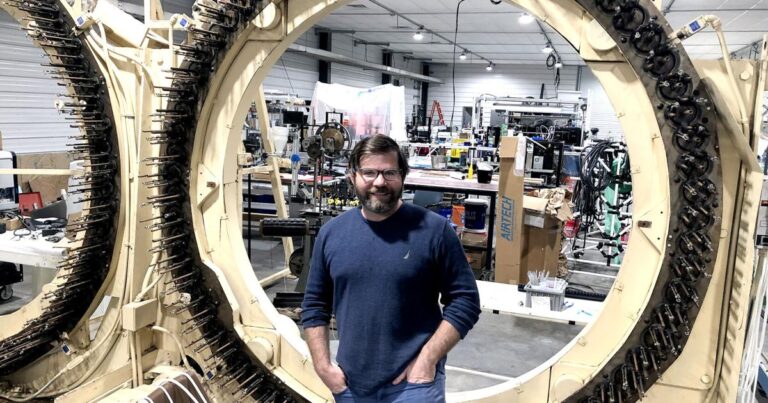
DBTechnologies isn’t a big company. It’s just a locally owned startup with a well-endowed brain trust; the kind of place where the ideas can be as small as a handheld gadget — or as big as the universe itself.
If that sounds like an exaggeration, well, the scope of what DBTech can do is only bounded by the limits of human exploration. Founded by Auburn Ph.D. David Branscomb as a business incubation project at Wallace State Community College, the company shared last year that it would make its permanent home at an adapted industrial site in Hanceville. At the company’s July 2021 announcement, Branscomb brought along a few scaled-down examples of what his materials technology company creates and makes — and it’s the kind of stuff that’s intended to be out of this world.
DBTechnologies specializes in high-strength, heat-resistant woven carbon fiber and other space-age materials, lightweight creations that find a use in everything from tennis racquets to rocket boosters. The company’s most eye-catching product might be its in-house designed rocket nozzle assembly, a reinforced carbon fiber cone made from the ground up to take the heat and pressure of the gravity-defying thrust of third-party NASA contractors such as SpaceX and Blue Origin.
Branscomb conceived the company as a way to bring high-tech solutions to a broad array of fields; items that range from the everyday and commonplace (such as sporting goods) to the truly far-out (think aerospace and beyond.) In short, DBTech creates advanced materials aimed at any application where strength, weight, and durability are at a premium.
A year on from its goal of moving from incubation to a fully-equipped manufacturing campus, DBTech continues to add to its staff — a collection of highly trained designers and fabricators who combine to give the company’s still-growing new home a studio-like feel. The creative aspect of what DBTech does is a core part of its business model: “We’re still adding to our staff, but each one of our people brings a lot of ideas and ingenuity to the table,” says Branscomb.
While the company puts the finishing touches on its fabrication facility — a repurposed industrial building on Alabama Highway 91 — it continues to maintain a presence on the Wallace State campus as an incubation startup. Branscomb says he’s a big fan of the college’s incubator program: “President [Vicki] Karolewics was one of the first to give us her total support, and it’s a relationship we want to reciprocate by hiring Wallace State graduates, and by continuing to work with the college whenever a new incubation idea emerges.”
With the school’s new Technical Education Center for Welding and Entrepreneurship, Wallace State will be positioned to extend its outreach to future small startups with big ideas. The new facility includes an Entrepreneurship Center and Technology Incubator, featuring seven incubation pods, an ideation station, and shared conference and workspace for hosted startup projects.